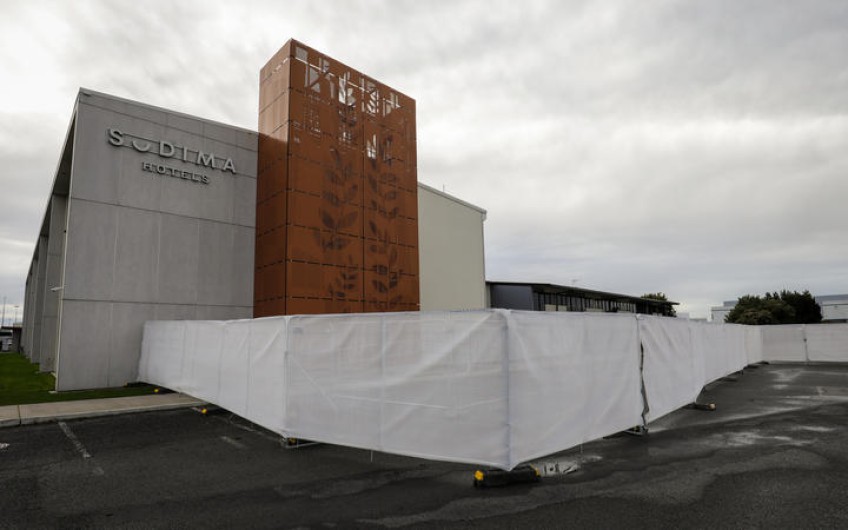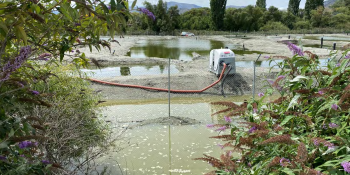No changes to border exemptions after fishing crew test Covid-19 positive

The government says no changes to border exemptions are being considered after 11 fishing crew who just arrived in the country tested positive for Covid-19.
Fishing crew arrived on the flight from Moscow into Christchurch last week and are in isolation at the Sudima Hotel.
Yesterday, 11 of the 237 crew members tested positive for the virus with a further 14 possible cases.
The Ministry of Health (MoH) said it was investigating after the cases were detected during routine day three testing.
None involved cases in the community, it said.
The MoH said the positive cases were part of a group who were the only people staying at the facility.
The crew were mostly Russians with others coming from Ukraine. Russia has recorded more than 1.3 million cases of Covid-19 - the fourth highest number of any country.
Immigration Minister Kris Faafoi said no changes to border exemptions were being considered at this point.
"The situation with fishing crew shows NZ's border management systems are working as they should and demonstrates why strict border management, testing and isolation procedures are critical to our Covid response."
Air Commodore Darryn Webb, who is overseeing isolation facilities, agreed.
"There's over 40 million Covid cases around the world so bringing in a large number of people from a place like Russia we were obviously expecting that there could be some positive cases that's one of the reasons we took extensive measures for their arrival," Webb said.
"We put them in an exclusive facility, we translated the welcome packs into Russian, we have bought in translation services on site and we operate at level 4 to keep everyone safe."
One hundred fishing crew have arrived on commercial flights since September, he said.
"We will just continue to work with the fishing companies at this stage the next and the final chartered flight is due to land on November 2nd, based on what we've seen on this instance we might make some changes but it's to early to make those calls now."
Authorities were going through medical details of the crew and will likely find out today if the crew were in fact tested before they left Russia.
It is not currently mandatory for people to isolate or be tested for Covid-19 before they fly to New Zealand - but Sealord, who helped bring the crew into the country, said the 237 people self isolated at home for two weeks and all returned negative results before leaving Moscow.
Webb said he understood everyone was tested 72 hours before the flight but it was then delayed by 24 hours - so the tests would have been 96 hours old.
Long-term risk needs to be addressed - epidemiologist
Epidemiologist Professor Michael Baker says it's unusual so many people in a managed isolation facility tested positive for Covid-19 if they isolated and were tested before arriving into New Zealand.
However he says we shouldn't be concerned.
"We're seeing imported cases pretty much every day in New Zealand and just looking at the last few weeks for example, we're seeing an average of about two imported cases a day going into managed isolation/quarantine facilities.
"Obviously what we're seeing here is a lot more cases in one day than usual."
It's part of an ongoing pattern where people who are testing positive have come from overseas - reflecting the fact that the pandemic has intensified in many parts of the world, Baker said.
This number of people testing positive at once is manageable but could become a problem if high numbers become very ill, he said.
"I think the wider issue is the long-term pattern and that is that every time we import a person who is positive to this virus that is an added risk to our system."
Over time the risk adds up, he said.
"Travellers from countries which have a very intense pandemic with a lot of transmission present, we need to look at steps before they travel to New Zealand to reduce that risk."
Covid-19 modeller Professor Shaun Hendy told First Up he believes it's most likely the crew picked up the virus during transit.
"Obviously it's going to be a challenge managing all of these cases, the previous Auckland outbreak we were using dedicated facilities to house the community cases... I think the good news is they are all in one facility and so that gives me confidence that we can manage those cases while minimising the risk of further cases."
Hendy says it's not easy to estimate the precise risks from particular countries.
"Of course all it takes, and quite possibly in this case, is just one of those people to carry the infection and then it can be passed on during transit."






















